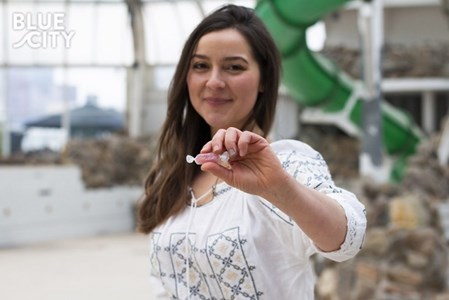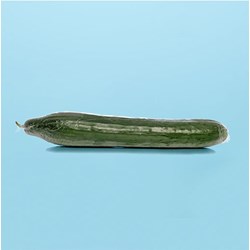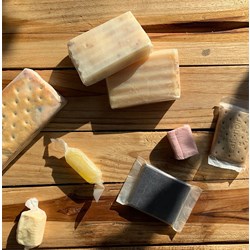One day, UnPlastic could replace every plastic packaging in the supermarket.
Interview with BlueCitizen Lori Goff of Outlander Materials
Is there a good alternative to Plastic? BlueCitizen Lori Goff of Outlander Materials is transforming the waste stream of beer brewery VET & LAZY into 'UnPlastic'; an alternative to single-use plastic. UnPlastic is functional, compostable and vegan. But most importantly: it is a circular product that will never break down into micro- or nanoplastics. The idea came a few years ago when Lori received a beer brewing kit as a birthday present. "I was brewing beer in my kitchen and started looking more seriously at the amount of waste that was produced during the beer brewing process. I thought: I can definitely make fun things out of this."
From beer to UnPlastic
And so she did. She set up shop at the BlueCity Lab, started experimenting and soon came into contact with VET & LAZY. “To make one liter of beer, you need seven liters of fresh water,” Lori claims. The remaining six liters, also known as brewery effluent, normally goes to waste. But not if it were up to Lori. “I use the waste stream that is created during the beer brewing process. Using biotechnology, we create a material that can be further developed into a non-plastic and can function as a new alternative to plastic.”
The first thing Lori made with this new material was candy wrappers, but it can be used to replace multiple types of single-use plastics. “There are different ways to process the wastewater from the brewery and there are many variables that I can change that affect the final material. This makes it suitable for multiple applications,” she says.
In addition, UnPlastic has several other advantages that could make it the ultimate alternative to single-use plastics. It is compostable, vegan, transparent, and it is possible to add flavors or scents to your liking.
From Nebraska to Rotterdam
It’s no surprise that an innovative idea like this popped into Lori’s head. “I’ve always been very environmentally conscious,” she explains, “when I was a kid, I watched a cartoon on TV called Captain Planet. It’s about a superhero who saves the environment over and over again. That image stuck with me, even now.”
She decided to study biotechnology. “I studied biotechnology because I wanted to have the scientific background to be able to successfully complete environmental projects and to give waste a functional purpose again.” After graduating, Lori moved from Nebraska (United States) to the Netherlands. Not long after, she was brewing beer in her kitchen and the whole story started.
From there, the road to BlueCity Lab was easy. It was a matter of one phone call and Lori was assured of her own Lab space. Something she is very grateful for: “ The BlueCity Lab is a living environment with everything I have always wanted. It is about circularity, minimizing waste and creating functional startups.” she says, “It’s about providing solutions to existing problems, and that’s exactly what I want to do.”
On the shelves
If you’re reading this, you might be wondering why you haven’t found UnPlastic in your local grocery store yet. “I’m currently working on a business case and talking to several companies about projects and funding,” Lori explains. “Our goal is to have 3-4 UnPlastic products on the shelves in about two and a half years!”
And Lori’s mission doesn’t stop there. She hopes to provide a solution to the plastic waste problem without eliminating packaging altogether. “We need packaging,” she explains, “because food travels from one place to another, and without the protection of packaging, we would have a lot more food waste. But to me, it just doesn’t make sense that we have food that has a limited shelf life but is wrapped in plastic that lasts forever.” And so Lori concludes: “I hope that UnPlastic will one day replace single-use plastic in the supermarket, from dry goods like pasta and rice to the wrappers for cookies, candy and syrup waffles!”
Text: Manon Dijkhuizen
Source: BlueCity.nl


Improving the shelf life of cucumbers and at the same time more hygienic with UnPlastic instead of 'normal' fossil plastics.

For example, sweets, snacks and personal care products can all be packaged in UnPlastics to reduce the use of and pollution from single-use plastics.